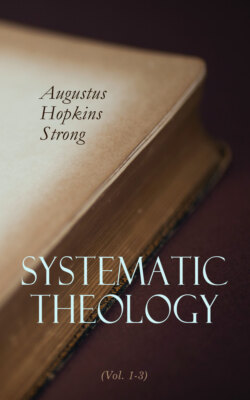Читать книгу Systematic Theology (Vol. 1-3) - Augustus Hopkins Strong - Страница 21
На сайте Литреса книга снята с продажи.
I. Sources of Theology.
ОглавлениеTable of Contents
God himself, in the last analysis, must be the only source of knowledge with regard to his own being and relations. Theology is therefore a summary and explanation of the content of God's self-revelations. These are, first, the revelation of God in nature; secondly and supremely, the revelation of God in the Scriptures.
Ambrose: “To whom shall I give greater credit concerning God than to God himself?”Von Baader: “To know God without God is impossible; there is no knowledge without him who is the prime source of knowledge.” C. A. Briggs, Whither, 8—“God reveals truth in several spheres: in universal nature, in the constitution of mankind, in the history of our race, in the Sacred Scriptures, but above all in the person of Jesus Christ our Lord.” F. H. Johnson, What is Reality? 399—“The teacher intervenes when needed. Revelation helps reason and conscience, but is not a substitute for them. But Catholicism affirms this substitution for the church, and Protestantism for the Bible. The Bible, like nature, gives many free gifts, but more in the germ. Growing ethical ideals must interpret the Bible.” A. J. F. Behrends: “The Bible is only a telescope, not the eye which sees, nor the stars which the telescope brings to view. It is your business and mine to see the stars with our own eyes.” Schurman, Agnosticism, 178—“The Bible is a glass through which to see the living God. But it is useless when you put your eyes out.”
We can know God only so far as he has revealed himself. The immanent God is known, but the transcendent God we do not know any more than we know the side of the moon that is turned away from us. A. H. Strong, Christ in Creation, 118—“The word ‘authority’ is derived from auctor, augeo, ‘to add.’ Authority adds something to the truth communicated. The thing added is the personal element of witness. This is needed wherever there is ignorance which cannot be removed by our own effort, or unwillingness which results from our own sin. In religion I need to add to my own knowledge that which God imparts. Reason, conscience, church, Scripture, are all delegated and subordinate authorities; the only original and supreme authority is God himself, or Christ, who is only God revealed and made comprehensible by us.” Gore, Incarnation, 181—“All legitimate authority represents the reason of God, educating the reason of man and communicating itself to it. … Man is made in God's image: he is, in his fundamental capacity, a son of God, and he becomes so in fact, and fully, through union with Christ. Therefore in the truth of God, as Christ presents it to him, he can recognize his own better reason—to use Plato's beautiful expression, he can salute it by force of instinct as something akin to himself, before he can give intellectual account of it.”
Balfour, Foundations of Belief, 332–337, holds that there is no such thing as unassisted reason, and that, even if there were, natural religion is not one of its products. Behind all evolution of our own reason, he says, stands the Supreme Reason. “Conscience, ethical ideals, capacity for admiration, sympathy, repentance, righteous indignation, as well as our delight in beauty and truth, are all derived from God.” Kaftan, in Am. Jour. Theology, 1900; 718, 719, maintains that there is no other principle for dogmatics than Holy Scripture. Yet he holds that knowledge never comes directly from Scripture, but from faith. The order is not: Scripture, doctrine, faith; but rather, Scripture, faith, doctrine. Scripture is no more a direct authority than is the church. Revelation is addressed to the whole man, that is, to the will of the man, and it claims obedience from him. Since all Christian knowledge is mediated through faith, it rests on obedience to the authority of revelation, and revelation is self-manifestation on the part of God. Kaftan should have recognized more fully that not simply Scripture, but all knowable truth, is a revelation from God, and that Christ is “the light which lighteth every man” (John 1:9). Revelation is an organic whole, which begins in nature, but finds its climax and key in the historical Christ whom Scripture presents to us. See H. C. Minton's review of Martineau's Seat of Authority, in Presb. and Ref. Rev., Apr. 1900:203 sq.
